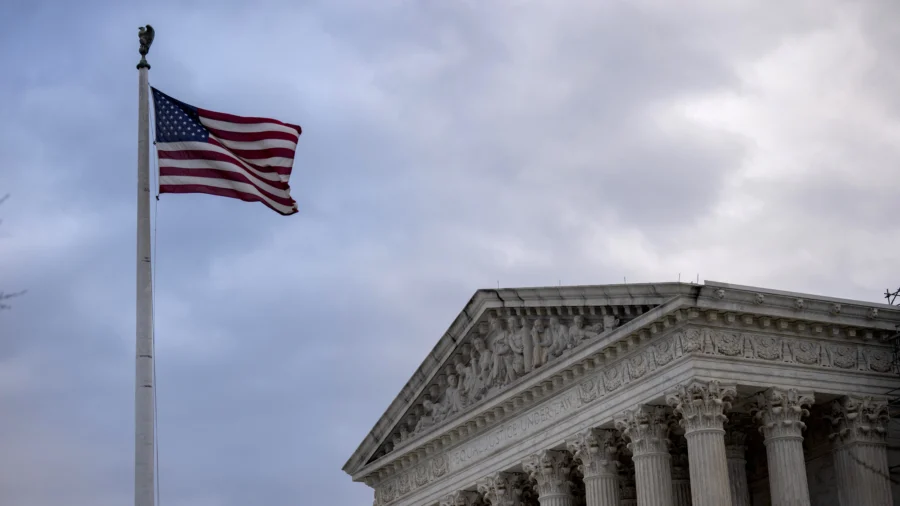The Supreme Court refused on Jan. 8 to hear Alaska’s appeal against the U.S. Environmental Protection Agency’s (EPA) decision to veto the proposed $400 billion Pebble Mine project in the southwestern part of the state.
The project site on state-owned land in the Bristol Bay area is reportedly home to the planet’s second-largest untapped deposit of copper. Demand for copper is expected to more than double by 2050.
Copper is essential to industries that make products favored by environmentalists, such as electric vehicles and wind turbines. Gold, silver, molybdenum, and rhenium also have been identified at the site.
Pebble Limited, which wants to develop the site, stated the project would generate as many as 2,000 jobs. Local fisheries, which environmentalists claim will be damaged by the project, generate $2 billion annually and support 15,000 jobs.
The Supreme Court denied the bill of complaint in Alaska v. United States in an unsigned order. No justices dissented. The court did not explain its decision. For a bill of complaint to move forward to the oral argument stage, at least four of the nine justices must grant it.
Alaska had argued that the case was so important that the Supreme Court should invoke its so-called original jurisdiction and hear the case before it worked its way through the lower courts.
Although almost all cases that come to the Supreme Court are appeals, occasionally the court will hear a case that has never been heard by a court under its original jurisdiction authority.
Under the U.S. Constitution and federal law, the Supreme Court will hear disputes affecting ambassadors, public ministers, and consuls and cases in which a U.S. state is a party. The court also can exercise jurisdiction in litigation between two or more states and in cases between the federal government and a state.
“Alaska tried to persuade the court that this is the rare kind of dispute that the justices should hear as a trial court, without having it go through lower courts first,” said Steve Vladeck, CNN Supreme Court analyst and professor at the University of Texas School of Law.
“Although there’s no explanation accompanying today’s denial, it stands to reason that a majority of the justices disagreed and were willing to let the case go through ordinary litigation in the lower courts first,” Mr. Vladeck said.
According to court documents, the EPA skipped the usual regulatory protocol and decided under Section 404(c) of the Clean Water Act to restrict the use of waters in the Bristol Bay watershed as disposal sites for discharges of dredged or fill material associated with developing the Pebble project site or any other similar project on state-owned lands nearby.
The EPA’s veto of the project included future mines in a 309-square-mile area. The U.S. Army Corps of Engineers turned down the mine application in 2020 but had agreed to review its decision.
Despite the access to environmentalist-favored copper promised by the project, environmentalists still claimed that the project would harm fisheries. The Army Corps of Engineers issued a Final Environmental Impact Statement in July 2020 stating that the mine wouldn’t adversely affect the Bristol Bay fishery.
‘Dangerous Precedent’
Last year, Alaska Gov. Mike Dunleavy, a Republican, said the EPA was wrong to intervene in the state’s affairs.
“EPA’s veto sets a dangerous precedent,” he said.
“Alarmingly, it lays the foundation to stop any development project, mining or non-mining, in any area of Alaska with wetlands and fish-bearing streams. My administration will stand up for the rights of Alaskans, Alaska property owners, and Alaska’s future.
“The State of Alaska has a responsibility to develop its resources to provide for itself and its people. Alaska does resource development better than any other place on the planet, and our opportunities to show the world a better way to extract our resources should not be unfairly preempted by the federal government.”
The Biden administration countered in a brief that the Bristol Bay watershed “is an area of unparalleled ecological value, boasting salmon diversity and productivity unrivaled anywhere in North America.”
“[The watershed is] also the location of a large copper-bearing ore body known as the Pebble deposit,” Solicitor General Elizabeth Prelogar wrote.
“After determining that discharges of dredged or fill material into waters of the United States associated with developing the Pebble deposit would have ‘unacceptable adverse effect[s]’ on fishery areas within the Bristol Bay watershed, the United States Environmental Protection Agency … exercised its authority under Section 404(c) of the Clean Water Act … to prohibit and restrict such discharges.”
The Supreme Court’s decision not to hear the case came after the nation’s highest court limited the EPA’s powers in recent years.
In May 2023, the court curbed the agency’s authority to regulate wetlands in Sackett v. EPA.
In June 2022, the court found in West Virginia v. EPA that the federal Clean Air Act doesn’t give the EPA widespread authority to regulate carbon dioxide emissions.
From The Epoch Times

